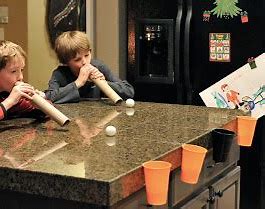Some homes have more cardboard boxes around than usual at the moment as we have to get more things delivered
This may be a nuisance, but cardboard boxes are also one of the most useful resources for play and learning. They can be anything your child wants to imagine them to be – a castle, a boat, a hat, or even just a box to put things in!
Today the idea is simply to give your child some boxes and some decorating materials and see what they do with them. If they are stuck you can help with ideas, but the best learning will come from them taking the lead and you following
Remember to chat about what they are doing – say what you see (try not to ask too many questions!) and wait for a response.














